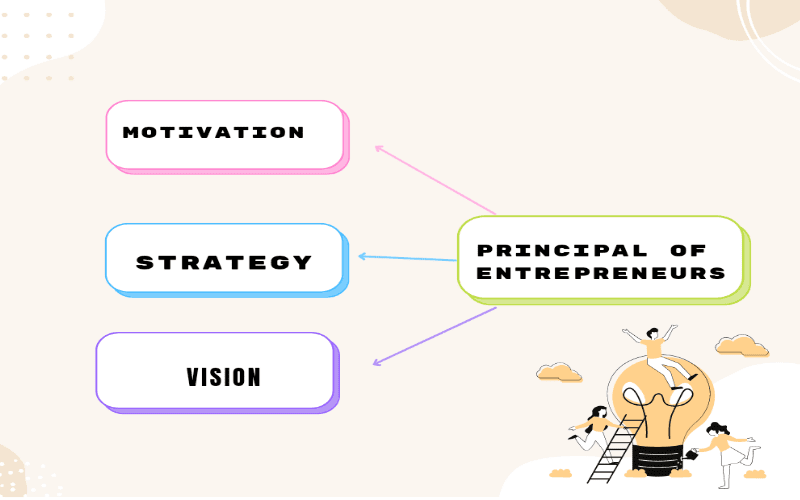3 principles of entrepreneurs
The development of the internet has revolutionized every aspect of life. The world is rapidly going towards digitization, due to which many new digital skills are emerging. Small business management is also now turning into a digital skill. Now, small businesses are also managing their records through digital devices and various software. Our website Digital Skills PK publishes articles on basic information about Small Business Management. We aim to enhance the knowledge of small entrepreneurs through these articles. We write articles on small business tips so that small business owners can benefit from them.
In this article, we will discuss the basics of small business.
Principle of entrepreneurs
One of the biggest challenges for any entrepreneur is the careful exercising of decision-making authority. A small business owner needs to exercise decision-making authority with care and balance. An entrepreneur is a practical person who does not hesitate to take advantage of any business opportunity. A good entrepreneur prepares to seize the opportunity. He always tries to minimize business risks.
When we talk about preparedness, it includes many types of strategies. We see that a good entrepreneur keeps strategies ready in case of market difficulties, increases, or decreases in supply and demand. He always tries to match his product or service to the market demand. Before that, he plans a good and practical business plan. He accurately estimates the capital requirement and plans for it.
There are many factors involved in the success and failure of any entrepreneur. Economists have identified some business principles by carefully analyzing the success and failure of entrepreneurs. Business owners can overcome many business problems by following these principles. Neglecting these principles and factors can lead to many types of losses. Like any other profession, the business has its essential requirements and demands. Without meeting these requirements, the success of any entrepreneur is a tough target.
Entrepreneurs come in many kinds and sizes, but typically share two characteristics: a conviction that they can fill a gap in the market and the other ready to take risks. Entrepreneurs, however, are more than just innovative, daring small business owners. They are generators of income and jobs and are also forces behind economic development.
Many dangers come with becoming an entrepreneur, especially at the beginning. Many business owners invest their savings in their startups. Very rare, lucky ones manage their funding from investors.
You must first comprehend the foundational principles of entrepreneurship to succeed as an entrepreneur. We are all familiar with the most well-known success stories in business, like Jeff Bezos, Bill Gates, Oprah Winfrey, and others who are looked up to as role models in the startup community. What did they understand other people did not? This article investigates that query.
You might find it useful to identify which type of entrepreneur you are before embarking on your entrepreneurial journey: an innovator, serial entrepreneur, a world-changer, or an imitator. Many entrepreneurs approach their business model, plan, and strategy from a unique perspective.
You should also think about if you would be more suited as an intrapreneur, which is sometimes known as a corporate entrepreneur. Intrapreneur provides the services to pursue entrepreneurial endeavors within the safer (and frequently more constrained) boundaries of an established organization.
Embrace these entrepreneurial concepts to enjoy the competitive advantage required for business success, regardless of the path at hand.
1. Motivation
What is the purpose of starting a business? Is business only for money?
Many entrepreneurs make a lot of money, but we know new businesses face financial difficulties in the initial stages of their start-up. Because of the scarcity of money, most of the new entrepreneurs do not withdraw money from the business even for their expenses.
Of course, earning money through business is also a motivation, but along with it, many other factors also motivate entrepreneurs. There are three main categories of motivations for entrepreneurial start-ups, which include financial, non-financial, and social service categories.
When we talk about the financial category, an entrepreneur creates a business setup for his profit or income.
Income is the cash a business owner receives as compensation or income. Any employee in a company can make money, but an entrepreneur might want to accomplish it by working for themselves.
Profit is the amount of money that remains after it has deducted all business expenses from sales revenue. If a company generates a sizable profit, an entrepreneur may earn more money working for themselves than for someone else who works for others.
Non-financial motives are the reasons an entrepreneur starts a business besides making money. Personal fulfillment, a challenge, being your boss, and independence are a few motives.
An entrepreneur could have some measure of personal satisfaction from having built a successful company. An entrepreneur can be able to turn a pastime or interest into a business.
When an entrepreneur starts a business, they do so hoping to become successful will push them beyond their comfort zone. The term “challenge meant what” can use here.
Entrepreneur who works for themselves has more control over their company and can decide how to operate it. These choices could affect what the company sells, where it sources its raw materials, and how much it charges for its goods or services.
Entrepreneurs that are independent work for themselves and are self-employed. They will also take charge of important corporate decisions. An entrepreneur starts a firm out of a desire for independence.
Social objectives relate to operating in an ethical or environment-friendly manner or having a business whose sole purpose is to meet social or community needs. For example, an entrepreneur’s business aim may be to provide only environmentally friendly products. A person can carry on the business of providing literature for a particular community. Businesses established for social or collective reasons are called social enterprises.
2. Strategy
Entrepreneurs can have a variety of backgrounds and use a range of skill sets to accomplish their objectives. A detailed analysis of entrepreneurship, however, reveals a few standard tactics that might support entrepreneurs in the early stages of their careers. Let’s look at some strategies used by the most successful entrepreneurs.
The key challenge is to concentrate first on identifying consumer problems. Next, go for solutions that customers need or want, as opposed to solutions that are unpleasant to have. The best answer frequently comes from your personal and professional experiences. That is the only method to determine whether an interesting need exists.
Building talented teams is important when starting a business because they are your most valuable asset. Selecting the ideal founder and merging the best abilities comes first.
It is crucial to create your team before the activity even begins. With the right people in the right places working together to achieve the objectives of the business model, it is the only way to achieve profitability.
As strong enthusiasm is likely, the first attribute needed for obtaining inspiration, drive, consistency, and courage, not to mention hard work and success, make sure your staff are committed and passionate and love their work.
Even when the conditions are favorable, the team is strong, and the idea is excellent, entrepreneurship is challenging.
A combination of two elements is required for the effective execution of the strategy:
First, balance your capacity to lead your team to create the project step by step and your entrepreneur’s confidence in your business ambitions.
Second, maintain developing your leadership and motivational skills.
Without a doubt, leadership is a major problem in entrepreneurship. There are two key requirements.
The most prosperous businesspeople can work and contribute to teams of any size. They can make a significant individual contribution to their endeavor and assume leadership of their group.
The most prosperous businesspeople can follow their instincts and intuition, even when they go against established rules or customs. Adversity fosters self-assurance and a sort of visceral understanding of the proper course of action in this way.
3. Vision
Vision is an important part of every person's future. It is also very important for entrepreneurs. Vision is the first of many steps toward making your plans and dreams a reality. Success is impossible without vision.
Many entrepreneurs start businesses with the desire that they will change the world. Most entrepreneurs know what they want and why they are in business.
For success, it is important to think about your business's future. What do you see in your future? How do you want to contribute to the world?
Every successful entrepreneur starts with a concept or an idea that he is passionate about creating. There is a passion for making an idea or concept a reality even when there is no idea how what he wants will become a reality. We consider vision to be the first step toward success. Vision defines what he wants to achieve. A successful entrepreneur decides for the next five or ten years where he will take his business. Vision is the foundation of all business strategies.
Unfortunately, many potential entrepreneurs do not turn their dreams and ideas into a concrete visions. A vision statement is a picture that shows what the business plan will be in the future and how it will proceed. We believe that the first concrete thing of a concept or idea is a vision statement, which is a declaration of your idea and intentions. Articulate your vision through a mission statement and then take action. Sometimes the mission statement needs to be changed during the process, which should be prepared for. A mission statement is an obvious declaration of what value the business will provide to the customer and how it will be delivered.
Transferring your vision to a piece of paper is difficult. Despite your best efforts, you will encounter problems. This is normal in the early stages. In the beginning, you make a sketch and start working. You should refine your vision in the light of experiences during practical work. We also recommend setting aside some time each day that you spend on this. Educate your mind to think about the vision you are setting for yourself. If you have a problem with mental retardation, change the environment. You can also hire someone who has experience in your desired business. Take someone around you as your mentor and discuss progress with them and discuss suggestions. Discussing ideas about future possibilities brings out many additional aspects. We believe that business vision is as important as business capital.
Also, read






0 Comments